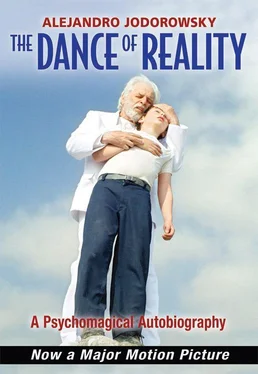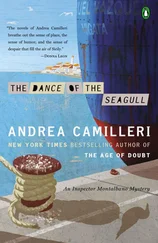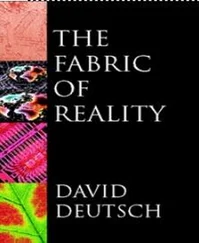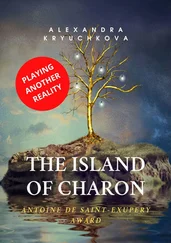It should be understood that all these things took place over a period of ten years. My relating them all together may make it seem as if my childhood was full of bizarre events, but this was not the case. These were small oases in an infinite desert. The climate was hot and dry. During the day an implacable silence descended from the sky, gliding in from the wall of barren mountains that held us against the sea, rising from a terrain made up of small rocks without a speck of fertile soil. When the sun went down there were no birds to sing, no trees for the wind to blow through, no crickets to chirp. There was only the odd vulture, the braying of a distant burro, the howls of a dog sensing death approaching, the seagulls skirmishing, and the constant crashing of the ocean waves whose hypnotic repetition one would eventually cease to hear. And the cold nights were even more silent: a thick mist, the camanchaca, gathered on the tops of the mountains to form an impenetrable milky wall. Tocopilla seemed like a prison full of corpses.
One night, when Jaime and Sara were out at the cinema, I awoke in a terrified sweat. The silence, an invisible reptile, had come in through the door and was licking the feet of my bed frame. I knew that I was in danger; the silence wanted to enter me through my nostrils, settle in my lungs, and drain the blood from my veins. To frighten it away, I began to scream. My cries were so intense the windowpanes began to vibrate, buzzing like wasps, which increased my terror. And then the Rebbe arrived. I knew that he was nothing but a simple image, and his apparition was not enough to prevent universal muteness. I needed the presence of friends, but what friends? Pinocchio — large-nosed, pale, circumcised — did not have friends. (In this torrid climate, sexuality came early. The firemen’s barracks was near our shop; on an old wall in their big courtyard, hanging like the strings of a gigantic harp, were ropes that served to hold up the hoses when they were cleaned and set out to dry after being used to put out fires. The watchman’s sons and their friends, a band of eight young rascals, invited me to climb twenty meters up to the top of the wall. Once there, out of sight of adult eyes, they formed a circle and began to masturbate at an age when the emission of sperm was still something legendary. Wishing to fit in, I did the same. Their immature phalli, covered by foreskins, rose up like brown missiles. Mine, which was pale, showed itself without hiding its wide head. They all noticed the difference and burst out laughing. “He’s got a mushroom!” Humiliated, red with embarrassment, I slid down the rope, scorching the palms of my hands. The news spread through the whole school. I was an abnormal boy with a different “wee-wee.” “He’s missing a piece, they cut it off!” Knowing that I was mutilated, I felt even more separated from other human beings. I was not of this world. I had no place. All I deserved was to be devoured by silence.)
“Do not worry,” the Rebbe told me, or rather I told myself using the image of that aged Jew who was dressed as a rabbi. “Loneliness means not knowing how to be with oneself.” Of course, I do not mean to imply that a child of seven years can speak in such a fashion. But I understood these things, albeit not in a rational manner. The Rebbe, being an internal image, put things into my mind that were not intellectual. He made me feel something that I swallowed, in the way that a newly hatched eaglet, its eyes still closed, swallows the worm that is placed in its beak. Much later as an adult I began to find words to translate things that were, at that young age — how can I explain it? — openings into other planes of reality.
“You are not alone. Remember last week when you were surprised to see a sunflower growing in the courtyard? You concluded that the wind had blown a seed there. A seed, though it looks insignificant, contains the future flower. This seed somehow knew what plant it was going to be, and this plant was not just in the future: although immaterial, although only a design, the sunflower existed there, in that seed, blowing in the wind over hundreds of kilometers. And not only was the plant there, but also the love of light, the turning in search of the sun, the mysterious union with the pole star, and — why not? — a form of consciousness. You are not different. All that you are going to be, you are. What you will know, you already know. What you will search for, you are already seeking: it is in you. I may not be real, but the old man who you now see, although he has my inconsistent appearance, is real because he is you, which is to say, he is what you will be.”
All this I neither thought nor heard, but I felt it. And in front of me, next to the bed, my imagination brought forth the apparition of an elderly gentleman with silver beard and hair, his eyes full of tenderness. It was myself, changed into my older brother, my father, my grandfather, my master. “Do not worry so. I have accompanied you and I always will. Every time you suffered, believing yourself to be alone, I was with you. Would you like an example? All right, remember when you made the elephant of snot?”
I had never felt so abandoned, misunderstood, and unjustly punished as on this occasion. Moishe, with his toothless smile and saintly heart, proposed to my parents that he take me to the capital of Santiago for a month during the summer vacation so that my maternal grandmother might get to know me. The old lady had never met me, being separated from her daughter by two thousand kilometers. I hid my anxiety at being away from home to avoid disappointing Jaime. Exhibiting a false tranquillity I boarded the Horacio, a small steamboat that rocked so much that I arrived with an empty stomach at the port of Valparaiso. After rattling for four hours in the third-class section of a coal train I presented myself, timid and green around the gills, to Doña Jashe, who did not know how to smile much less how to deal with children as unhealthily sensitive as myself. Sara’s half-brother Isidoro, a fat, effeminate, and sadistic man dressed in a male nurse’s uniform, began to harass me, threatening me with an insecticide bomb. “I’m going to give you an injection in your ass!”
At night, in a dark room on a small hard bed fixed to the wall, with no lamp for reading, illuminated by whatever moonlight might filter through the narrow skylight, I stuck my finger up my nose, made balls of snot, and stuck them to the sky-blue wallpaper. During that month, little by little, I drew an elephant with my boogers. No one knew, for they never entered to clean or make my bed. At the end of the month, my pachyderm was just about finished. At the time of my departure, as Moishe was about to go back to Tocopilla with me, my grandmother came into the room to retrieve the sheets she had lent me. She did not see a beautiful elephant floating in the infinite sky; she saw a horrible collection of boogers stuck to her precious wallpaper. Her wrinkles turned a shade of violet, her hunched back straightened up, her amiable voice changed into the roar of a lion, her glassy eyes turned into balls of lightning. “Disgusting boy, pig, ingrate! We’ll have to paper the whole room again! You ought to die of shame! I do not want such a grandson as you!”
“But Grandmother, I didn’t mean to get anything dirty, I just wanted to make a nice elephant. It just needed a tusk, then it would have been finished.” This made her even more furious. She thought I was making fun of her. She grabbed a handful of my hair and began pulling, with the intention of yanking it out. Gandhi intervened, holding her back with gentle firmness. The odious joker Isidoro, behind Jashe, waved his insecticide bomb in my direction, agitating it back and forth like a violating phallus.
Читать дальше












